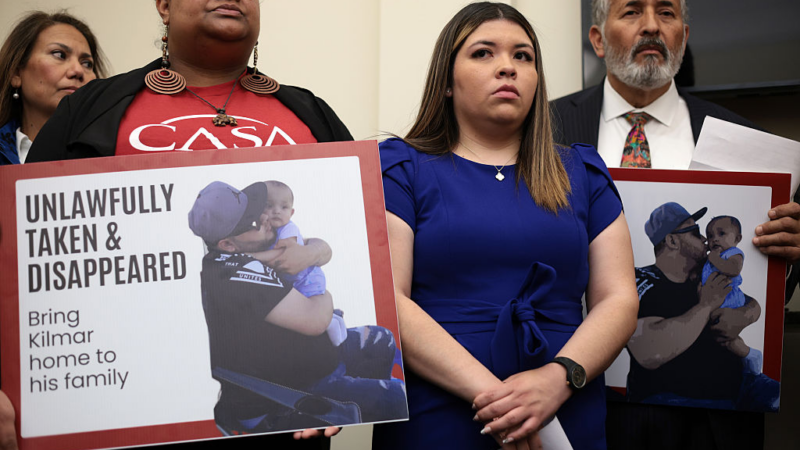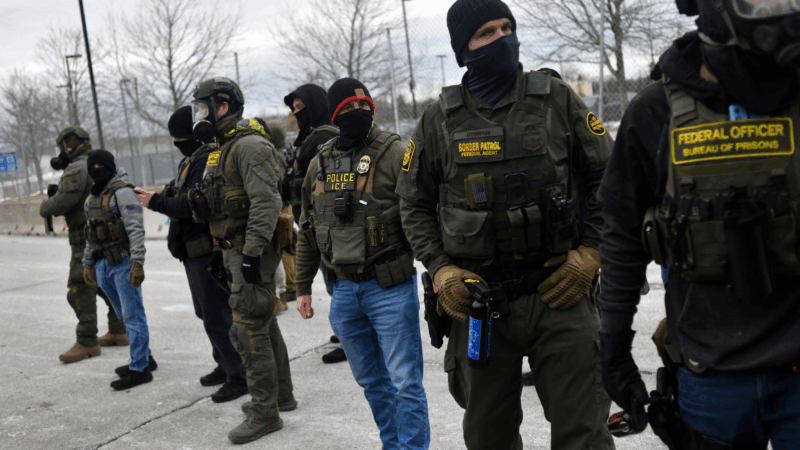Supreme Court says Trump officials should help return wrongly deported Maryland man
The Supreme Court has ordered the Trump administration to “facilitate” the return to the United States of Kilmar Armando Abrego Garcia, a Maryland man who was mistakenly taken to El Salvador and remains in custody there.
In a brief, unsigned decision issued Thursday, the court sided with a District Court judge who had ordered Abrego Garcia brought back to the U.S.
“The order properly requires the Government to ‘facilitate’ Abrego Garcia’s release from custody in El Salvador and to ensure that his case is handled as it would have been had he not been improperly sent to El Salvador,” the Supreme Court said in its ruling.
The decision was a rare win for those challenging the administration’s deportation orders. But it also left several key specifics unanswered for right now. The court said it was sending the case back to the district court judge to clarify one aspect of her decision “with due regard for the deference owed to the Executive Branch in the conduct of foreign affairs.”
An ‘administrative error’
Since President Trump took office in January, a top priority has been to remove those he believes are a threat to Americans’ safety. In this case, though, the administration initially admitted the deportation was a mistake.
Abrego Garcia, an El Salvadoran citizen, has lived in Maryland for almost 15 years. While he initially entered the U.S. without being granted legal status, a federal judge in 2019 granted him protection from being deported, because of concerns for his safety if he were to return to El Salvador.
The 2019 proceedings stemmed from uncorroborated allegations that Abrego Garcia was a member of the MS-13 gang, which the Trump Administration has since designated a Foreign Terrorist Organization. But an immigration judge ultimately found that there was insufficient evidence to support the allegation and instead found that Abrego Garcia’s life would be endangered if he returned to El Salvador.
Since then, Abrego Garcia has lived and worked legally in Maryland, and has had no criminal record.
But in March, he was on his way home from work in Baltimore, with his five-year-old son in the backseat, when he was pulled over by Immigration and Customs Enforcement agents. They told him his legal “status had changed,” and he was arrested on the spot, as his wife, an American citizen, raced to the site to prevent ICE agents from turning over the couple’s child to Child Protective Services.
A few days later, Abrego Garcia was placed on a flight with other men alleged by the Trump administration to be members of the Venezuelan gang Tren de Aragua.
In a separate, but related, case out of Washington, D.C., the Supreme Court on Monday dismissed a judge’s ruling that temporarily blocked deportations under the Alien Enemies Act of 1798.
Unlike the challengers in that case, Abrego Garcia was not removed using the Alien Enemies Act. Still, the court’s ruling left open questions as to how deportees who have already been removed from the U.S., like Abrego Garcia, are supposed to challenge their deportations from outside the country.
The administration has avoided answering judges’ questions as to the number of individuals deported, how many planes have left the United States or the whereabouts of specific individuals.
Abrego Garcia, along with the other deportees, is being detained in a Salvadoran mega-prison, but his wife has said she has not heard from him since he was removed from the U.S.
In exchange for detaining the deportees in what one judge has called “one of the most dangerous prisons in the Western Hemisphere,” the Salvadoran government is receiving $6 million from the U.S. government.
Abrego Garcia, along with his wife and child, are contesting his removal from the U.S. The family argues that his deportation was unlawful given his protected status, which specifically barred him from being sent back to El Salvador without clearing some procedural hurdles first.
Indeed, a Justice Department lawyer conceded in court that Abrego Garcia’s deportation was a mistake, or as he put it, an “administrative error.”
The government says it can’t force El Salvador to act
Last Friday federal district court judge Paula Xinis ordered the administration to preserve the status quo by releasing Abrego Garcia from the Salvadoran prison and returning him to the U.S., and to do it no later than 11:59 PM the following Monday.
When the administration asked the Fourth Circuit Court of Appeals to pause that order, a three-judge panel unanimously declined. Judge J. Harvie Wilkinson III, a Reagan appointee, had strong words for the administration.
“There is no question that the government screwed up here,” he wrote, adding that “the government here took the only action which was expressly prohibited.”
Regarding the government’s admission of its mistake, Judge Wilkinson said “one would also expect the government to do what it can to rectify it. Most of us attempt to undo, to the extent that we can, the mistakes that we have made. But, to the best of my knowledge, the government has not made the attempt here.”
In an appeal to the Supreme Court, however, the administration said in its brief that the lawyer who admitted the error does not speak for the administration. In fact the lawyer was placed on leave after making the admission. And the administration continued to push the theory that Abrego Garcia is a member of MS-13, despite an immigration judge finding otherwise in 2019.
Separate and apart from that, the government argued that because Abrego Garcia is now outside the U.S., the administration cannot force the government of El Salvador to take any action, let alone to release Abrego Garcia from prison.
Finally, the government complained that its blunder didn’t authorize Judge Xinis to “seize control over foreign relations, treat the Executive Branch as a subordinate diplomat, and demand that the United States let a member of a foreign terrorist organization into America.”
With just hours left before the deadline on Monday, the Supreme Court granted a brief administrative stay to give the justices time to consider the matter.
There were no noted dissents in Thursday’s ruling, which included a statement from the three members of the court’s liberal wing that was sharply critical of the administration’s arguments.
“The Government’s argument, moreover, implies that it could deport and incarcerate any person, including U. S. citizens, without legal consequence, so long as it does so before a court can intervene,” wrote Justices Sonia Sotomayorr, Elena Kagan and Ketanji Brown Jackson.
Thursday’s ruling shows that there is no predicting what the Supreme Court might do next when it comes to the Trump administration.
NPR legal affairs intern Christina Gatti contributed to this report.
High-speed trains collide after one derails in southern Spain, killing at least 21
The crash happened in Spain's Andalusia province. Officials fear the death toll may rise.
United Nations leaders bemoan global turmoil as the General Assembly turns 80
On Saturday, the UNGA celebrated its 80th birthday in London. Speakers including U.N. Secretary-General António Guterres addressed global uncertainty during the second term of President Trump.
Parts of Florida receive rare snowfall as freezing temperatures linger
Snow has fallen in Florida for the second year in a row.
European leaders warn Trump’s Greenland tariffs threaten ‘dangerous downward spiral’
In a joint statement, leaders of eight countries said they stand in "full solidarity" with Denmark and Greenland. Denmark's Prime Minister Mette Frederiksen added: "Europe will not be blackmailed."
Syrian government announces a ceasefire with the Kurdish-led Syrian Democratic Forces
Syria's new leaders, since toppling Bashar Assad in December 2024, have struggled to assert their full authority over the war-torn country.
U.S. military troops on standby for possible deployment to Minnesota
The move comes after President Trump again threatened to invoke the Insurrection Act to control ongoing protests over the immigration enforcement surge in Minneapolis.







